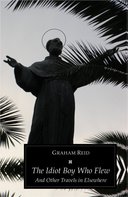Beloved Leader and No.1 Citizen Kim John-Kee said from Hanoi last night he was “relaxed and comfortable” at sweeping changes being made to the rules of Parliament which “will be necessary for passage of legislation crucial to the on-going well-being of the Republic and its citizens”.
The new rules will allow for the No.1 Citizen and No.2 Citizen Gerry Brown-Lee to have casting votes on all legislation, whether Parliament's votes be deadlocked or not.
These sweeping new powers -- “admittedly Draconian, but which will be exercised with care and caution,” said No. 2 Citizen Brown-Lee yesterday – have been prompted by the impasse over the passage of the Child Labour and Exploitation Bill.
This new Bill will drop the age of sexual consent to 12 and permit children to be employed for 14 hour days without a meal break.
These are the conditions insisted on by noted film director Romanesque Polanski who has offered to make a $1000 million series of three films in New Zealand “if the conditions for employment and exploitation of children were right”.
The films under the working title Precious Little Things are expected to employ over 10,000 children in sweat shop conditions but No.1 Citizen John-Kee said last night, “the many rallies of support for Mr Polanski held around the country have shown that New Zealand parents and care-givers are more than happy for their children to be thrown into servitude for the good of the economy.
“We applaud the parents and care-givers for their support of indentured labour and allowing children as young as 12 to be used as sexual slaves so we can secure the important economic inputs these films will bring.”
Mr Polanski is expected to begin shooting at remote locations around Westport and Denniston before Christmas although the exact sites of the camps for the children will not be disclosed. The film company will also be bringing its own camp leaders and it is believed New Zealand parents and care-givers will have limited access to the children during the year-long shoot.
“Yeah, no, we are thrilled that Samantha and Jack will have the opportunity to participate in such an important international series as this,” said Mrs Briar Fair-Reason of Grey Lynn whose two children, aged 11 and 13, have been accepted for minor roles in the Precious Little Things series.
“And that this is doing something for our fragile film industry and the greater economy just makes us even more proud. We feel we are doing our bit in these troubled times.”
The passage of the Child Labour an Exploitation Bill has been fraught since it was first discussed five days ago under urgency.
At every vote the two sides – dubbed “we Patriots, and the Haters and Knockers on the other side” by No.2 Citizen Brown-Lee – the numbers were tied and a casting vote could have have come from an unlikely quarter, the independent candidate for Somewhere, Mr Chris Carterton.
Mr Carterton – wearing a charcoal grey suit, and in bare feet – spoke a number of times during the debate, but only to himself. Despite overtures from both sides of the House, he declined to vote on any legislation which – according to No.1 Citizen John-Kee – has necessitated the changes to Parliament's rules.
Small rallies are being held today to protest the working conditions for children on the film shoot.
Secretary of the Combined Union of The People, Ms Helen Kel-Lee said last night, “We have always been very keen to continue dialogue and have a free and frank discussion to resolve this matter with the respected director Polanski -- but frankly this sucks big time and Polanski is nothing but a jumped-up little shit and nasty creep who hasn't made a decent film since Chinatown's Baby.
“That said, we still have the greatest respect for him and welcome an open and friendly dialogue with Mr Polanski.”
Invited to comment on Ms. Kel-Lee's statement No.1 Citizen John-Kee said, “I thought secretaries just took notes”.
And then smiled in a way that looked . . . oddly familiar.
Otherwise: A version of sanity reigns here
